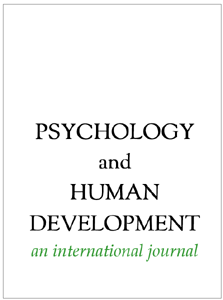The effects of prosocial modeling on young children’s nurturing of a “sick” child
Main Article Content
We explored the effects of prosocial modeling on young children’s caretaking of a “sick” child confederate. One group was exposed to affection and caretaking modeling, a second to only caretaking modeling, and a third to affectively neutral (control) modeling. While the children displayed almost no affectionate behavior when tested, there was a high but nondifferential rate of caretaking across all 3 groups. However, the affection and caretaking group displayed significantly more generalized nurturance than the caretaking only and control groups. A teacher’s rating prior to the experiment showed that there was a significantly positive correlation between the children’s affectionate disposition and subsequent caretaking behavior. Our findings indicate that young children are far more able to produce complex prosocial behavior than was believed previously.
